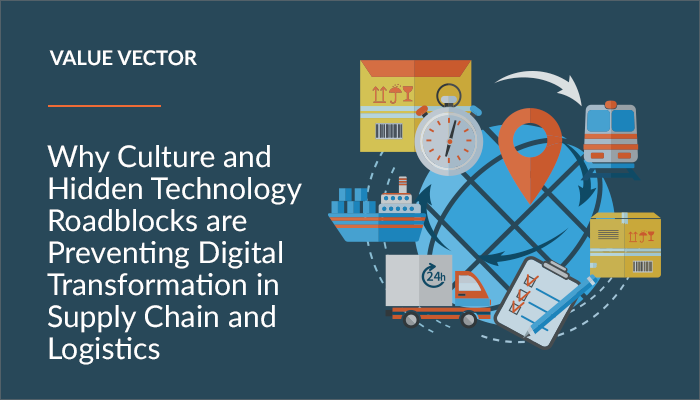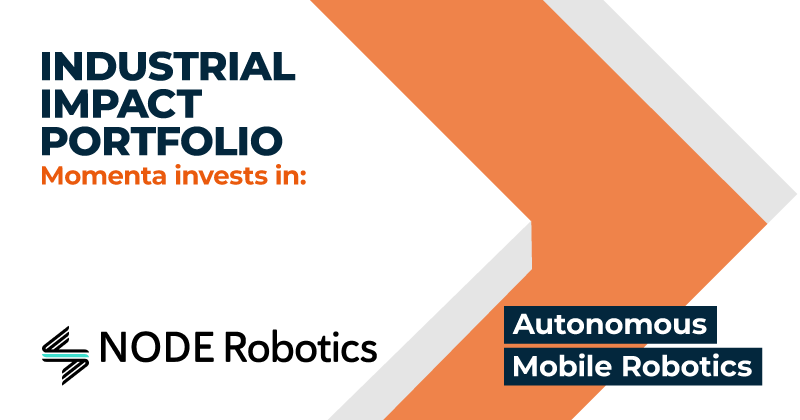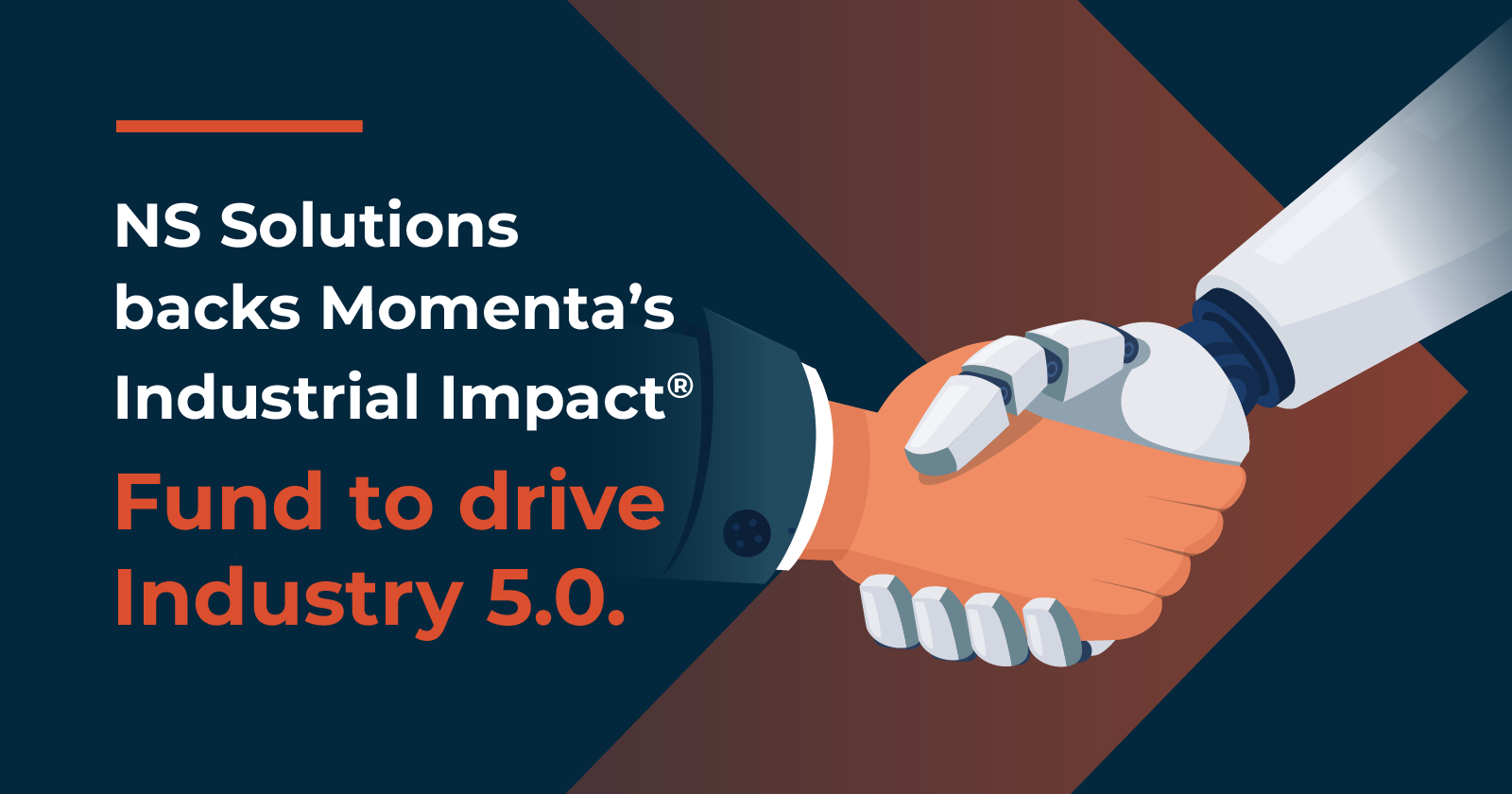Value Vector
Hidden Technology blockers are Preventing Digital Transformation
Sandra Mueller


Supply Chain and Logistics are Behind the Curve Compared to other Industries
Janiero Digital surveyed 98 middle and senior-level managers in the supply chain and found that on average, supply chain and logistics are behind the curve compared to other industries, attributing this the fact that supply chain is not naturally a digital business—supply chain and logistics professionals’ core aptitude has historically been around very concrete and physical objects such as packages and vehicles, rather than digital technology. They found that when it comes to implementing new digital technologies, there’s a big gulf between supply chain and logistics professionals. The largest group—50 percent of the total respondents—report that they aren’t implementing any new technologies.
Research by Deloitte and the Manufacturers Alliance for Productivity and Innovation (MAPI) surveyed more than 200 companies operating in the manufacturing sector and conducted more than a dozen executive interviews on the opportunities and challenges involved in implementing a Digital Supply Network (DSN). They found that 51 percent of respondents believe their DSN maturity is at least “above average” when compared to their competitors, even though only 28 percent of the respondent companies have begun implementing DSN solutions. The researchers suggest that the resulting blind spot could have devastating consequences for a manufacturer that does not recognize the implications of inaction and the resulting potential for disruption.
Blame it on the Culture?
The Deloitte research makes mention of “cultural conservatism among the manufacturing elite” and Janeiro mentions “A deeply divided field where culture is the biggest factor holding businesses back from pursuing new technologies.”
Slightly more optimistic research by JDA Software Inc and the respondents of the 2018 Intelligent Manufacturing survey found that almost half (46 per cent) are actively engaged in upgrading their systems with new digital technologies in response to both the amazon effect and external factors like near shoring where business operations are being brought closer to home.
Opportunities for Innovation!
Not all is lost, Janeiro do note that 36.7 percent of respondents say their companies are looking to implement new technologies. More than two-thirds (69.4 percent) of those companies looking to implement new technology report that their organization has already started its digital transformation. They note: “This is consistent with what we’ve seen in working with supply chain and logistics professionals. Companies often delay change, but once they get started they’ll shoot forward along the path to digital maturity.”
How can one successfully Unlock Ecosystem Value to Harness the Value of Digital Supply Chains?
Having been at the forefront of innovation and technology across Supply Chain and Logistics for nearly 20 years, Lauren Salisbury believes success comes from a paradigm shift in the industry to unlock ecosystem collaboration to harness the true value of digital supply chains. I spoke to her to find out more. Based on these guiding principles of collaboration, Lauren sees fours key building blocks for any organisation to consider:
- Culture: This industry has always been challenging when it comes to technology led change, and with good reason. "We must recognise that it is the human asset for which industry has been built on, and there is a resistance to technology due to fear of job security, and/or lack of technological skills. As digital leaders, it is our responsibility to educate and create trust, and think more innovatively around how we can use IoT technology to harness the vast physical assets in industry, rather than putting the onus on people that don’t want it."
- Foundational Excellence: Technology debt is high in this industry which has often been seen as a blocker. "In today's climate however, it is possible to bring modern technology into the business both rapidly and with excellence due to cloud based TMS and WMS, often ready out of the box. Organizations should be cautious acquiring solutions that require custom development and administration, as there will be burden on the ability to collaborate easily across the ecosystem, and to serve value added solutions to customers and partners."
- Maximize Collaboration: True business value is driven from being able to easily integrate with the ecosystem. Selecting platforms that enable modern interoperability and identity management is crucial to the foundations of digital transformation. Getting these foundations in place, albeit they may be integrated back to legacy solutions today, will become the fabric of your digital transformation.
- Customer Led and Strategy Aligned: Digital Transformation must be a business led program. If a use case is not aligned to the strategy, and does not have customer value…..then don’t do it! This will require more innovative thinking around business cases, which will encourage well designed digital products and services. For example, safety might be argued as an internal benefit, however, having a well communicated, measure safety tick will promote customer acquisition and stickiness – not withstanding safety comes as a value-added benefit to process automation which has tangible benefits to customers.
A Culture of Innovation is Needed!
Before any digital transformation can start, a culture of innovation is vital. In supply chain and logistics, already tight margins make investments in new digital technologies feel that much riskier. Inaction can feel like the safer road forward, but in reality, it’s the riskiest long-term strategy a business can take. Making the decision to move forward with innovation and digital transformation is the first step towards finding stability and success.
While these building blocks for Digital Transformation are being realized, the new transformational digital services and products can also be recognized in tandem, around building new customer-led use cases that leverage emerging and prevailing technologies like IoT, AI, Augmented Reality, and blockchain technologies across a connected supply chain, enabling it to be truly transformational.
Drowning in hype cycles and statistics about IoT, blockchain and Connected Industry? Momenta Partners takes a fresh look at the challenges confronting industry through a series of thought pieces: podcasts, webinars, blog posts and whitepapers. Learn how our industry insights can help grow your business.



